SWEDISH
SOUTH ASIAN STUDIES NETWORK
Newsletter 91:
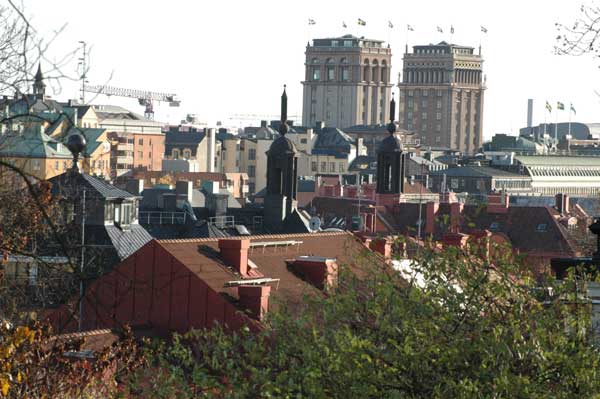 5 December 2008
5 December 2008
| Educational News |
| Politics and Business |
| South Asia related Culture |
| New and updated information |
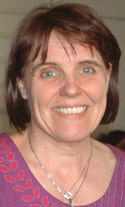 • Anna Lindberg back as Director
• Anna Lindberg back as Director
From December 1, 2008, SASNET's Director Anna Lindberg is back in office after a prolonged sick leave. During her absence, Dr. Sidsel Hansson from the Centre for East and South-East Asian Studies (ACE) has substituted her as acting Director of SASNET, but she is now working as co-ordinator for the new Erasmus Mundus External Cooperation Window India programme (EMECW lot 15).
For some time, Anna Lindberg will only work as Director on a 25 % basis. Therefore SASNET has recruited Dr. Stig Toft Madsen from the Nordic Institute of Asian Studies (NIAS) in Copenhagen from December 1 to work as Assistant Director on another 25 % basis. He works from a room next to SASNET’s root node office at Scheelevägen 15 D in Lund. More information about Dr. Toft Madsen (who defended his doctoral dissertation at the Dept. of Sociology, Lund University in 1995).
• Karl Reinhold Haellquist Memorial Collection (KRHMC) web site on Mahatma Gandhi
 On December 1, 2008, SASNET launched the Karl Reinhold Haellquist Memorial Collection (KRHMC) web site on Mahatma Gandhi. The site presents unique material on Gandhi from the private library collection of the
renowned Swedish historian Karl Reinhold Haellquist, who passed
away in 2000 after working for many years at the Nordic Institute of Asian Studies
(NIAS) in Copenhagen. A large part of the collection, more than 6000 South Asia related
books, journals, videotapes and pamphlets on various aspects
of South Asian studies, was later donated to SASNET/Lund University by his wife, Inger Sondén-Haellquist. SASNET has been instrumental in cataloguing the books that have been integrated in Lund University’s Asia Library, and parts of the collection has been put on display in shelves in the library (adjacent to the SASNET root node office in Lund, open Monday-Friday 9–17, at Scheelevägen 15 C, ground floor). More information on the Karl Reinhold Haellquist book donation.
On December 1, 2008, SASNET launched the Karl Reinhold Haellquist Memorial Collection (KRHMC) web site on Mahatma Gandhi. The site presents unique material on Gandhi from the private library collection of the
renowned Swedish historian Karl Reinhold Haellquist, who passed
away in 2000 after working for many years at the Nordic Institute of Asian Studies
(NIAS) in Copenhagen. A large part of the collection, more than 6000 South Asia related
books, journals, videotapes and pamphlets on various aspects
of South Asian studies, was later donated to SASNET/Lund University by his wife, Inger Sondén-Haellquist. SASNET has been instrumental in cataloguing the books that have been integrated in Lund University’s Asia Library, and parts of the collection has been put on display in shelves in the library (adjacent to the SASNET root node office in Lund, open Monday-Friday 9–17, at Scheelevägen 15 C, ground floor). More information on the Karl Reinhold Haellquist book donation.
 In 2007, the
Crafoord Foundation also decided to give a grant to
SASNET in order to digitalize other parts of Karl Reinhold Haellquist’s
private archive. With supplementary funding from SASNET this work has been carried out during the Fall 2008 by a hired librarian, Erik Svanström. Since K R Haellquist had a specialised interest in Mahatma Gandhi, we decided to concentrate our efforts around the vast material on Gandhi in Haellquist’s material.
In the new web site we meet Gandhi through Haellquist’s lecture notes. We hope that it will continue to spread light on Gandhi and his ideas. We like to thank Inger Sondén-Haellquist for all the time and effort that she has given us. We also wish to thank the GandhiServe Foundation for their kind permission to make digital use of the images in Haellquist's lecture notes. Go for the KRHMC web site on Gandhi.
In 2007, the
Crafoord Foundation also decided to give a grant to
SASNET in order to digitalize other parts of Karl Reinhold Haellquist’s
private archive. With supplementary funding from SASNET this work has been carried out during the Fall 2008 by a hired librarian, Erik Svanström. Since K R Haellquist had a specialised interest in Mahatma Gandhi, we decided to concentrate our efforts around the vast material on Gandhi in Haellquist’s material.
In the new web site we meet Gandhi through Haellquist’s lecture notes. We hope that it will continue to spread light on Gandhi and his ideas. We like to thank Inger Sondén-Haellquist for all the time and effort that she has given us. We also wish to thank the GandhiServe Foundation for their kind permission to make digital use of the images in Haellquist's lecture notes. Go for the KRHMC web site on Gandhi.
• Minutes from SASNET’s board meeting
The SASNET board met
in Lund on Tuesday 26 August 2008. The verified minutes are now available (as a pdf-file).
• Dissertations, other books and magazines in SASNET’s collection
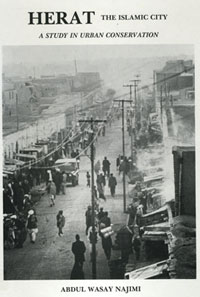 SASNET has a unique collection of books about South Asia in its root node office at Scheelevägen 15 D in Lund. The library consists of more than 120 doctoral dissertations from the middle of the 1990s (and in some cases even older) up to 2008 published in Sweden and the other Nordic countries; besides a large number of other titles. The unpretentious SASNET library encompasses a wide range of subjects, reflecting the variety of South Asia related research topics undertaken in the Nordic countries.
We also keep a collection of mostly Sri Lanka related books donated to SASNET by the Swedish journalist Thomas Bibin. It includes books, pamphlets and articles (mostly from Sri Lankan authors) from the 1960s onwards.
Finally the library contains all the leading international peer-reviewed South Asia related journals within humanities and social sciences.
Books and journals can be borrowed from Lars Eklund, who manages the collection. SASNET also gladly accepts any new publications from recent PhDs, researchers and academics in the Nordic countries.
SASNET has a unique collection of books about South Asia in its root node office at Scheelevägen 15 D in Lund. The library consists of more than 120 doctoral dissertations from the middle of the 1990s (and in some cases even older) up to 2008 published in Sweden and the other Nordic countries; besides a large number of other titles. The unpretentious SASNET library encompasses a wide range of subjects, reflecting the variety of South Asia related research topics undertaken in the Nordic countries.
We also keep a collection of mostly Sri Lanka related books donated to SASNET by the Swedish journalist Thomas Bibin. It includes books, pamphlets and articles (mostly from Sri Lankan authors) from the 1960s onwards.
Finally the library contains all the leading international peer-reviewed South Asia related journals within humanities and social sciences.
Books and journals can be borrowed from Lars Eklund, who manages the collection. SASNET also gladly accepts any new publications from recent PhDs, researchers and academics in the Nordic countries.
– Go for the catalogue of South Asia related theses in SASNET’s collection.
– Other books in the SASNET collection (pdf-file).
– The Thomas Bibin collection (pdf-file)
– Peer-reviewed journals (pdf-file)
• Colombo workshop on Women and migration in South Asia
On 9–11 February 2009, SASNET organises a workshop on ”Women and migration in South Asia.
Health and Social Consequences” in Colombo, Sri Lanka. The workshop will be held in connection to a meeting of SASNET’s South Asian Reference Group. Speakers from the South Asia region and from Swedish institutions have been invited to discuss consequences of migration for women, their children and families in South Asia. The themes to be covered are the effects of such migration with respect to: – social consequences; – gender perspective; – economy at family level; – health including sexually transmitted diseases; and – child development and psychology.
The workshop is the first effort to realise the concept of SASNET sub-networks, put forward at the informal meeting by SASNET’s South Asian Reference Group held in Delhi in November 2007 (more information), later decided upon by SASNET’s board. One of the reference group members, Dr. Kumudu Wijewardena from the University of Sri Jayewardenepura (SJP) in Colombo will chair the Colombo workshop along with Prof. Gunilla
Lindmark from the Division of International Maternal and Child Health (IMCH), Uppsala University.
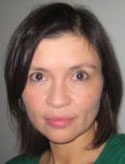 • Coordinator for the Asian Dynamics Initiative visited SASNET
• Coordinator for the Asian Dynamics Initiative visited SASNET
Marie Yoshida, coordinator for the Asian Dynamics Initiative (ADI) at the University of Copenhagen visited SASNET on Thursday 20 November 2008. Ms. Yoshida who is based at the Nordic Institute of Asian Studies (NIAS) in Copenhagen wanted to strenghten links to SASNET. Possible forms of future collaboration were discussed. Lars Eklund also demonstrated SASNET’s website and its wealth of information on South Asia related research at the Swedish universities.
• Seteney Shami from SSRC visited SASNET
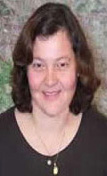 Dr. Seteney Shami, Program Director for Eurasia, Middle East and North Africa at the Social Science Research Council (SSRC) in New York, USA, visited SASNET’s root node office in Lund on Monday 1 December 2008. During the academic year 2008/09, Dr. Shami is a research fellow at the Swedish Collegium for Advanced Study (SCAS) in Uppsala. She came to SASNET to discuss possibilities for setting up an international collaborative network for the study of inter-Asian processes and developments. SSRC plans for a project titled ”Inter-Asian
Connections”. SASNET was represented by its director Anna Lindberg and Dr. Sidsel Hansson. Dr. Leif Stenberg from Lund University’s Centre for Middle Eastern Studies (CME), and Prof. Roger Greatrex from the Centre for East and South-East Asian Studies (ACE) also participated in the meeting. After fruitful discussions, it was suggested that Lund University will host a network planning meeting in the Spring 2009. This would include 10–15 people
representing different institutions across Asia as well as Europe and
America. More information about Seteney Shami.
Dr. Seteney Shami, Program Director for Eurasia, Middle East and North Africa at the Social Science Research Council (SSRC) in New York, USA, visited SASNET’s root node office in Lund on Monday 1 December 2008. During the academic year 2008/09, Dr. Shami is a research fellow at the Swedish Collegium for Advanced Study (SCAS) in Uppsala. She came to SASNET to discuss possibilities for setting up an international collaborative network for the study of inter-Asian processes and developments. SSRC plans for a project titled ”Inter-Asian
Connections”. SASNET was represented by its director Anna Lindberg and Dr. Sidsel Hansson. Dr. Leif Stenberg from Lund University’s Centre for Middle Eastern Studies (CME), and Prof. Roger Greatrex from the Centre for East and South-East Asian Studies (ACE) also participated in the meeting. After fruitful discussions, it was suggested that Lund University will host a network planning meeting in the Spring 2009. This would include 10–15 people
representing different institutions across Asia as well as Europe and
America. More information about Seteney Shami.
• Sidsel Hansson participated in the FOI Pakistan conference
![]() SASNET’s acting director Sidsel Hansson participated in a conference on “Pakistan – Consequences of Deteriorating Security in Afghanistan”, that the Swedish Defence Research Agency, FOI, organised in Stockholm on 9–10 October 2008.
The keynote speakers included Dr. Stephen Cohen (author of Four Crises and a Peace Process 2007), Shuja Nawaz (author of Crossed Swords: Pakistan, its Army and the Wars Within from 2008) and others. Several speakers at the conference drew attention to a recent report by the Pakistan Policy Working Group entitled ”The Next Chapter: The United States and Pakistan”. This report suggests a new Pakistan policy for the incoming administration in the United States.
SASNET’s acting director Sidsel Hansson participated in a conference on “Pakistan – Consequences of Deteriorating Security in Afghanistan”, that the Swedish Defence Research Agency, FOI, organised in Stockholm on 9–10 October 2008.
The keynote speakers included Dr. Stephen Cohen (author of Four Crises and a Peace Process 2007), Shuja Nawaz (author of Crossed Swords: Pakistan, its Army and the Wars Within from 2008) and others. Several speakers at the conference drew attention to a recent report by the Pakistan Policy Working Group entitled ”The Next Chapter: The United States and Pakistan”. This report suggests a new Pakistan policy for the incoming administration in the United States.
The October conference was a follow-up on a previous workshop organised by FOI in April 2008, where also SASNET’s deputy director Lars Eklund participated and where other participants were invited from different Swedish universities, research institutes and government departments. The April workshop and the October conference form part of an ongoing FOI research programme on Asian Security. Within this framework, the Swedish Defence Research Agency has initiated a number of sub-projects dealing with Pakistan. One project focuses on militant movements in Afghanistan & Pakistan, a second on
Pakistan’s nuclear weapons: Safety, security and non-state threats; and a third on the Federally Administered Tribal Areas (FATA). In a special project, the FOI researchers have also studied Pakistan’s development after the parliamentary elections held in February 2008.
• More information about SASNET and its
activities
See SASNET’s page, http://www.sasnet.lu.se/sasnet.html
• Sida funding for South Asia related developmental research
![]() On 21 November 2008, Sida’s (Swedish International Cooperation
Development Agency) so-called U-landsforskningsråd decided
upon the 2008 grants applications. Some of the
projects that get funding for 2009
deal directly with South Asia related research. The recipients include Dr. Camilla Orjuela (photo to the right), Dept. of Peace and Development Studies (PADRIGU), School of Global Studies, Göteborg University, who receives SEK 750 000 for a project on ”Corruption and Conflict: Connections and Everyday Consequences in Sri Lanka”; Dr. Matilda Nicklasson, Dept. of Microbiology and Immunology, Sahlgrenska Academy, Göteborg University who receives SEK 600 000 for a project on ”Molecular epidemiology of enterotoxigenic Escherichia coli (ETEC) in the context of virulence, patient group, spread, and seasonality in Bangladesh”; and Prof. Stig Larsson, Division of Social Medicine and Global Health, Lund University who receives SEK 1 000 000 for a two years extension on his ongoing project on ”The
role of assistive technology among people with disabilities in the south:
Poverty alleviation and human rights in Bangladesh”. Other Swedish researchers with South Asia related projects that receive funding from Sida are Prof. Marie Vahter, Division of Metals & Health, Institute of Environmental Medicine, Karolinska Institutet; Prof. Vinod Diwan, Division of International health
(IHCAR), Karolinska Institutet; Prof. Magnus Larsson, Division of Water Resources Engineering, Lund University; and Prof. Sylvia Lindberg, Plant Physiology, Dept. of Botany, Stockholm University. Go
for SASNET’s list of South Asia related projects funded
by Sida/SAREC 2008.
On 21 November 2008, Sida’s (Swedish International Cooperation
Development Agency) so-called U-landsforskningsråd decided
upon the 2008 grants applications. Some of the
projects that get funding for 2009
deal directly with South Asia related research. The recipients include Dr. Camilla Orjuela (photo to the right), Dept. of Peace and Development Studies (PADRIGU), School of Global Studies, Göteborg University, who receives SEK 750 000 for a project on ”Corruption and Conflict: Connections and Everyday Consequences in Sri Lanka”; Dr. Matilda Nicklasson, Dept. of Microbiology and Immunology, Sahlgrenska Academy, Göteborg University who receives SEK 600 000 for a project on ”Molecular epidemiology of enterotoxigenic Escherichia coli (ETEC) in the context of virulence, patient group, spread, and seasonality in Bangladesh”; and Prof. Stig Larsson, Division of Social Medicine and Global Health, Lund University who receives SEK 1 000 000 for a two years extension on his ongoing project on ”The
role of assistive technology among people with disabilities in the south:
Poverty alleviation and human rights in Bangladesh”. Other Swedish researchers with South Asia related projects that receive funding from Sida are Prof. Marie Vahter, Division of Metals & Health, Institute of Environmental Medicine, Karolinska Institutet; Prof. Vinod Diwan, Division of International health
(IHCAR), Karolinska Institutet; Prof. Magnus Larsson, Division of Water Resources Engineering, Lund University; and Prof. Sylvia Lindberg, Plant Physiology, Dept. of Botany, Stockholm University. Go
for SASNET’s list of South Asia related projects funded
by Sida/SAREC 2008.
• Sida funding for old and new Swedish research networks
On the same day, Sida’s U-landsforskningsråd also decided upon applications for research networks – sister networks to SASNET. The following network applications were granted:
– Swedish Research Network for Sustainable Agriculture and Forestry for Development – RENSAD, applied for by Swedish University of Agricultural Sciences (Lisa Sennerby Forsse). For three years (SEK 1.15 m+1.6 m+1.6 m).
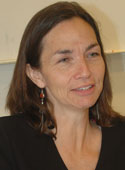 – DevNet: The Development Research Network on Nature, Poverty and Power, applied for by Uppsala University (Heidi Moksnes, photo to the left). For three years (SEK 750 000+750 000+750 000). More information about DevNet, established in January 2008.
– DevNet: The Development Research Network on Nature, Poverty and Power, applied for by Uppsala University (Heidi Moksnes, photo to the left). For three years (SEK 750 000+750 000+750 000). More information about DevNet, established in January 2008.
– The Swedish Network of Peace, Conflict and Development Research, applied for by Göteborg University (Joakim Öjendal). For three years (SEK 750 000+750 000+600 000). More information about the PeaceNetwork, established in 2005.
– Child survival – reaching the target. A thematic network to promote research and advocacy, applied for by Uppsala University (Lars Åke Persson). For two years (SEK 700 000+700 000).
– RESELA (Red Sueca de Estudios Latino Americanos) - Swedish Network for Latin American Studies, applied for by Stockholm University. For one year (SEK 400 000).
• South Asia related Swedish Research Links grants for 2009–11
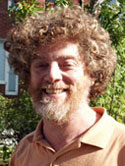 On 25 November 2008, Swedish
Research Links grants for the period 2009-11 were decided upon
for a large number of Asia related research projects. Sida and the Swedish Research Council
initiated the Swedish Research Links programmes in 2002, and
within this framework the Asian–Swedish Research partnership
programme specifically aims to stimulate contacts between
Swedish researchers and researchers in Asia. Prof. Edward Moore, Institute of Biomedicine, Göteborg University, receives SEK 750 000 for an India related project titled ”Microbial Diversity and Development
of Antibiotic Resistance Associated
with Industrial Wastewater Treatment”, and Prof. Martin Rottenberg (photo to the right), Dept. of Laboratory Medicine, Karolinska Institutet, receives SEK 720 000 for a Pakistan related project titled ”Regulation and role of ’Suppressor of
Cytokine Signalling’ proteins in the
outcome of infection with
Mycobacterium tuberculosis”. 16 other approved
projects also directly relate to South Asia, including five project
from Lund University, two each from Chalmers University of Technology, Göteborg University, Uppsala University, and Karolinska Institutet, and one each from KTH, Luleå University of Technology and Stockholm University. Go
for SASNET’s list of South Asia related projects given
Swedish Research Links grants 2008
On 25 November 2008, Swedish
Research Links grants for the period 2009-11 were decided upon
for a large number of Asia related research projects. Sida and the Swedish Research Council
initiated the Swedish Research Links programmes in 2002, and
within this framework the Asian–Swedish Research partnership
programme specifically aims to stimulate contacts between
Swedish researchers and researchers in Asia. Prof. Edward Moore, Institute of Biomedicine, Göteborg University, receives SEK 750 000 for an India related project titled ”Microbial Diversity and Development
of Antibiotic Resistance Associated
with Industrial Wastewater Treatment”, and Prof. Martin Rottenberg (photo to the right), Dept. of Laboratory Medicine, Karolinska Institutet, receives SEK 720 000 for a Pakistan related project titled ”Regulation and role of ’Suppressor of
Cytokine Signalling’ proteins in the
outcome of infection with
Mycobacterium tuberculosis”. 16 other approved
projects also directly relate to South Asia, including five project
from Lund University, two each from Chalmers University of Technology, Göteborg University, Uppsala University, and Karolinska Institutet, and one each from KTH, Luleå University of Technology and Stockholm University. Go
for SASNET’s list of South Asia related projects given
Swedish Research Links grants 2008
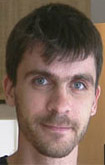 • Swedish Research Council funding for Sri Lanka project
• Swedish Research Council funding for Sri Lanka project
In November 2008, the Swedish Research Council for Environment, Agricultural Sciences and Spatial Planning (Formas), decided
upon the 2008 grants applications. At least one South Asia related research projects was given funding. Dr. Jonas Lindberg (photo to the right), Dept. of Human and Economic Geography, School of Business, Economics
and Law at Göteborg University was given SEK 700 000 as a two-years grant for a project titled ”Diversifying within or away from poverty? Understanding implications for wellbeing of rural livelihood diversification. Cases from southern Sri Lanka”. More information about the project. ![]()
• Time to apply for the Erasmus Mundus External Cooperation
Window programme (EMECW) lot 15
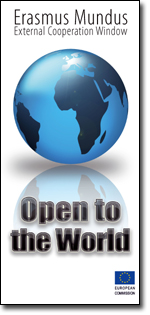 The Erasmus Mundus External Cooperation Window programme (EMECW) lot 15 – the India lot coordinated by Lund University – is now functional. The EMECW lot 15 programme with a mobility flow of 400 fully funded students, researchers and academic staff per year (75 % from India to Europe and 25 % from Europe to India) starts from 2009, and an online application page has been opened at the project web site http://www.erasmuswindow15.org. Please note, that it will be open only up till Monday 15 December 2008.
The Erasmus Mundus External Cooperation Window programme (EMECW) lot 15 – the India lot coordinated by Lund University – is now functional. The EMECW lot 15 programme with a mobility flow of 400 fully funded students, researchers and academic staff per year (75 % from India to Europe and 25 % from Europe to India) starts from 2009, and an online application page has been opened at the project web site http://www.erasmuswindow15.org. Please note, that it will be open only up till Monday 15 December 2008.
EMECW 15 is designed to fund higher education student and teaching staff mobility activities between 12 European universities and eight Indian universities. Candidates from other Indian universities are however also eligible to apply for scholarships. The EMECW 15 scheme is part of the general Erasmus Mundus External Cooperation Window programme, a project funded by the European Union to increase cooperation and exchange between Europe and other parts of the world. More information about all EMECW programmes, including the other South Asia oriented Erasmus Mundus External Cooperation Window programme lot (No. 12, involving India, Pakistan, Nepal and Sri Lanka) that is also coordinated by a Swedish university – Mälardalen University.
Through EMECW 15, successful applicants (undergraduate, graduate, doctoral and post-doctoral students and academic staff) will be awarded a scholarship which will cover travel, insurance, possible tuition, living expenses and housing, for a period from one to 34 months, depending on the type of position applied for. Dr. Sidsel Hansson is the Coordinator for the whole project.
The 12 European universities behind the EMECW 15 consortium are • Lund University, Sweden (coordinating partner); • Karolinska Institutet Medical University (KI) in Stockholm, Sweden; • Katholieke Universiteit Leuven, Belgium; • Pierre & Marie Curie University (UPMC) in Paris, France; • Freie Universität Berlin, Germany; • Albert-Ludwigs-Universität Freiburg, Germany; • Politecnico di Milano, Italy; University of Vilnius, Lithuania; • University of Amsterdam, Netherlands; • International Institute for Geo-Information Science and Earth Observation (ITC) in Enschede, Netherlands; • Norwegian University of Science and Technology (NTNU) in Trondheim, Norway; and • University of Deusto in Bilbao, Spain.
The Indian consortium members are • University of Delhi; • Jadavpur University, Kolkata; • University of Pune; • University of Kerala; • Indian Institute of Technology (IIT) in Kanpur; • Tata Institute of Social Sciences (TISS) in Mumbai; • Pravara Institute of Medical Sciences in Loni, Maharashtra; and • Anand Agricultural University, Gujarat.
Additionally, four associate partners (two in Europe and two in India) are connected to the consortium: • Swedish Organisation for Individual Relief (SOIR) based in Lund, Sweden; • ALBOAN Foundation, Madrid, Spain; • Centre for Research and Education for Social Transformation (CREST) in Kozhikode, Kerala; and • Sampark Journal of Global Understanding in Kolkata. The role of these institutions will be to suggest candidates for the mobility programme from so-called vulnerable groups (target group 3).
– For more information about the possibilities for Indian students/researchers/academic staff, read the press release.
– More information about the possibilities for European students/researchers/academic staff, read separate press release.
• Sida Science Day 2008
On Wednesday 17 December 2008, 9–17, the Swedish International Development Cooperation Agency Sida organised what is called The Sida Science Day. This will become an annual event to monitor the
implementation of Sida’s strategy for the advancement of research in
developing countries during the period 2009–13. The Sida Science Day should provide a context
analysis in the area of research policy in low income countries and present
major research findings from research cooperation programmes.
The Sida Science Day 2008 was divided into two parts, the first one is only open to Sida staff and other stakeholders
within Sida, and focuses entirely on Africa. The second part, however, was open to a broader audience, and has a wider scope.
In this afternoon session, from 15–17, representatives for the
Swedish Ministry of Education, directors of the Swedish Research Councils,
Vice Chancellors and Professors of Swedish universities and university colleges were invited to discuss issues such as ”The Swedish Research Bill
2008”; ”The Swedish policy for
research cooperation with
developing countries”; and ”The Swedish experience of research cooperation”. Full information about the Sida Science Day 2008.
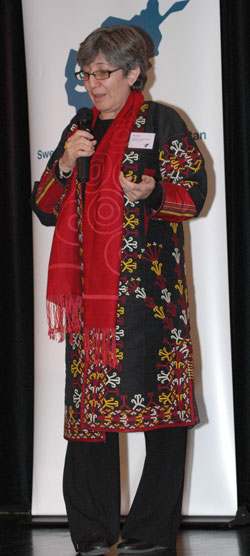 • Report from the Stockholm conference on Peacebuilding in Afghanistan
• Report from the Stockholm conference on Peacebuilding in Afghanistan
An International conference on ”Peacebuilding in Afghanistan: Local, regional and global perspectives” was held in Stockholm 6–7 November 2008. The conference focused on what the peacebuilding efforts look like in the country? What roles do the Afghan authorities, the International Community, the UN and the Nato-led ISAF forces play? Do they contribute to peace or armed conflict? Are there local initiatives at grassroots level promoting peace and how does the civilian population contribute to the reconstruction of the country? Why does Afghanistan receive so little funding for reconstruction compared to other areas of armed conflict? Have the complex developments in Afghanistan become something that the West would rather not have to deal with? What actions are needed in order for Afghanistan to become a country of peace and stability?
The conference was organised by the Swedish Committee for Afghanistan (SCA), in cooperation with ENNA (European Network of NGOs in Afghanistan). Invited speakers included prominent persons such as Sima Samar (photo to the right), Chairperson of the Afghan Independent Human Rights Commission; Kristian Berg Harpviken,
senior researcher at the International Peace Research Institute (PRIO) in Oslo; and the eminent Pakistani writer/journalist Ahmed Rashid.
Read a report by Lars Eklund, representing SASNET at the conference.
• India-EU Higher Education Symposium in New Delhi
 The India-EU Higher Education Symposium was held on Wednesday 12th November 2008 in New Delhi. The main objective of the India-EU Higher Education Symposium is to address EU-Indian higher education policy and cooperation issues. It will provide a platform for high-level dialogue between government officials, key senior managers and policy makers from India and Europe and representatives from higher education institutions and academic networks. The aims of the Symposium are to: •
facilitate collaboration between EU and Indian higher education institutions; •
exchange information on policy issues and practices through sharing key development issues in academic cooperation between senior educationalists and policy leaders; •
create a forum for strategic and policy dialogue to enhance mutual understanding of priorities and possible future cooperation areas; and • identify common agendas, possible cooperation areas and to develop mutually beneficial collaborative projects.
The India-EU Higher Education Symposium was held on Wednesday 12th November 2008 in New Delhi. The main objective of the India-EU Higher Education Symposium is to address EU-Indian higher education policy and cooperation issues. It will provide a platform for high-level dialogue between government officials, key senior managers and policy makers from India and Europe and representatives from higher education institutions and academic networks. The aims of the Symposium are to: •
facilitate collaboration between EU and Indian higher education institutions; •
exchange information on policy issues and practices through sharing key development issues in academic cooperation between senior educationalists and policy leaders; •
create a forum for strategic and policy dialogue to enhance mutual understanding of priorities and possible future cooperation areas; and • identify common agendas, possible cooperation areas and to develop mutually beneficial collaborative projects.
The India-EU Higher Education Symposium is an event of the European Commission and will be implemented by a consortium composed of three European agencies: The European University Association (EUA), German Academic Exchange Service (DAAD), and Netherlands Organization for International Cooperation in Higher Education (Nuffic). Following the Symposium, matchmaking activities will be organised to enable representatives from European and Indian higher education institutions to meet and discuss possibilities for future cooperation. Venue: InterContinental The Grand, Connaught Place, Delhi. More information.
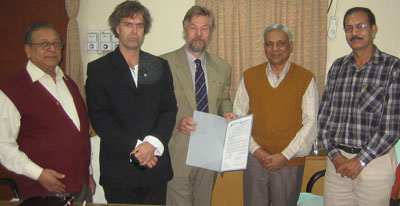 |
Signing of the MoU in Varanasi. From left to right: Prof. Rana P. B. Singh, Dr. Daniel Andersson and Prof. Åke Sander, Göteborg University, Prof. B.D. Singh, Rector of BHU, and Prof. Mallicarjun Joshi, Coordinator, International Cell, BHU. |
• Academic collaboration between Göteborg and Varanasi
On 22 November 2008, the University of Göteborg finalized a memorandum of understanding (MoU) with the Banaras Hindu University (BHU). The agreement focuses on collaboration in various fields of knowledge, including arts, humanities, philosophy and religious studies, environmental and geosciences, heritage studies, medical sciences, and also in the field of technology. The two universities have already been involved in research collaboration for the past 20 years. The key persons that have worked out the MoU are Prof. Åke Sander, Dept. of Religious Studies and Theology, Göteborg University, and Prof. Rana P. B. Singh, Dept. of Cultural Geography and Heritage Studies, BHU.
• James Heitzman passed away
On 15 November 2008, Prof. James Heitzman passed away in Stanford hospital, California, while receiving treatment for cancer. Prof. Heizman, a renowned historian of South Asia and urban studies scholar, should have visited Lund University and given a SASNET lecture there on Tuesday 11 November 2008 (more information), but due to health problems the visit was cancelled. He is remembered for his love of South Asia and his life-long commitment to furthering knowledge of the region's history and society. His numerous publications and research interests (in Buddhism, Chola history, the medieval world, cities, Bangalore, science and technology) include books such as ”Gifts of Power” (1997), ”The World in the Year 1000” (2003), ”Network City” (2004), and ”The City in South Asia” (2008). He is survived by his wife Smriti Srinivas, Professor of Anthropology at the University of California, Davis with whom he enjoyed an extraordinarily creative scholarly collaboration in the last decades of his life. More information in the H-Asia obituary.
• Research project on cultural differences affecting IT outsourcing from Sweden to India
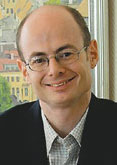 Mikael Gislén is living in Chennai, India, being the Managing Director of Gislen software established in 1994. It is an Indian based IT company which works mainly with clients from Sweden and Norway, using its own resources but also outsourcing to other Indian IT companies. During the last few years Mr. Gislén has focused on how to get maximum results when working with outsourcing projects, in particular focusing on problems that may arise when companies outsource work from Scandinavia to India. He has studied for example cultural differences, communication challenges, how to manage requirements, governance and overcome other cultural hurdles. In 2007, he participated in an Institute of Electrical and Electronics Engineers (IEEE) conference in New Delhi, where various speakers highlighted the cultural challenges. Mikael Gislén and Vanitha Venugopal have written a paper where they highlight some of the existing challenges and give suggestions on how to improve the way outsourcing projects are managed. Read the paper, titled ”Managing the Cultural Challenges for Successful Software
Outsourcing” (as a pdf-file).
To reach further, Mikael Gislén
has initiated a research project at Örebro University and its Business School. The project includes a survey which should be answered by Swedish outsourcing companies, Indian IT suppliers and last but not least by individuals working directly in core functions where their role is to overcome the cultural challenges and to build bridges between Indian and Swedish cultures. Till now, Mr. Gislén has received answers from several large Indian outsourcers, but he still lacks answers from companies who have outsourced IT projects. Therefore, he now invites representatives for Indian IT suppliers to ask people in their organisations, ideally project managers with personal experience of building bridges or decision makers, to contact Mr. Gislén. The questionnaire can then be downloaded from the Internet. Go for the questionnaire (as a Word file). The filled in questionnaires should be sent by e-mail to Mikael Gislén.
Mikael Gislén is living in Chennai, India, being the Managing Director of Gislen software established in 1994. It is an Indian based IT company which works mainly with clients from Sweden and Norway, using its own resources but also outsourcing to other Indian IT companies. During the last few years Mr. Gislén has focused on how to get maximum results when working with outsourcing projects, in particular focusing on problems that may arise when companies outsource work from Scandinavia to India. He has studied for example cultural differences, communication challenges, how to manage requirements, governance and overcome other cultural hurdles. In 2007, he participated in an Institute of Electrical and Electronics Engineers (IEEE) conference in New Delhi, where various speakers highlighted the cultural challenges. Mikael Gislén and Vanitha Venugopal have written a paper where they highlight some of the existing challenges and give suggestions on how to improve the way outsourcing projects are managed. Read the paper, titled ”Managing the Cultural Challenges for Successful Software
Outsourcing” (as a pdf-file).
To reach further, Mikael Gislén
has initiated a research project at Örebro University and its Business School. The project includes a survey which should be answered by Swedish outsourcing companies, Indian IT suppliers and last but not least by individuals working directly in core functions where their role is to overcome the cultural challenges and to build bridges between Indian and Swedish cultures. Till now, Mr. Gislén has received answers from several large Indian outsourcers, but he still lacks answers from companies who have outsourced IT projects. Therefore, he now invites representatives for Indian IT suppliers to ask people in their organisations, ideally project managers with personal experience of building bridges or decision makers, to contact Mr. Gislén. The questionnaire can then be downloaded from the Internet. Go for the questionnaire (as a Word file). The filled in questionnaires should be sent by e-mail to Mikael Gislén.
• Papers invited for International Joint Journal Conference in Engineering
 The International Joint Journal Conference in Engineering (IJJCE 2009) is now being organised. This virtual conference is chaired by Prof. D. Soni at Kreara IT Solutions in Thiruvananthapuram, and
Prof. Vinu V Das, from Saintgits College of Engineering in Kottayam, India. IJJCE 2009 is the World's first Engineering/Computing and Systems Research journal conference, where blind papers are peer reviewed and accepted papers are published in International Journals. No paper presentation is required. IJJCE 2009 will consist of a group of four conferences/tracks: • An International Journal Conference in Recent Trends in Computer Science (CS); • An International Journal Conference in Recent Trends in Electrical & Electronics (EE); • An International Journal Conference in Recent Trends in Mechanical Engineering (ME); and • An International Journal Conference in Recent Trends in Civil Engineering (CE). Graduate students and scholars are now invited and encouraged to submit research papers to IJJCE 2009.
The Academy Publishers in Oulu, Finland will be publishing the special journals (both print and CD media). All the accepted papers will be available in their Digital Library resources forever, which will be indexed in the major academic databases. All submissions, including Regular papers, Short papers, and other have to be made through the Easy chair Conference papers submission system. Deadline for full paper submission is Monday 15 December 2008. Dispatching for the print Journal will be on 25 May 2009. More information about IJJCE 2009.
The International Joint Journal Conference in Engineering (IJJCE 2009) is now being organised. This virtual conference is chaired by Prof. D. Soni at Kreara IT Solutions in Thiruvananthapuram, and
Prof. Vinu V Das, from Saintgits College of Engineering in Kottayam, India. IJJCE 2009 is the World's first Engineering/Computing and Systems Research journal conference, where blind papers are peer reviewed and accepted papers are published in International Journals. No paper presentation is required. IJJCE 2009 will consist of a group of four conferences/tracks: • An International Journal Conference in Recent Trends in Computer Science (CS); • An International Journal Conference in Recent Trends in Electrical & Electronics (EE); • An International Journal Conference in Recent Trends in Mechanical Engineering (ME); and • An International Journal Conference in Recent Trends in Civil Engineering (CE). Graduate students and scholars are now invited and encouraged to submit research papers to IJJCE 2009.
The Academy Publishers in Oulu, Finland will be publishing the special journals (both print and CD media). All the accepted papers will be available in their Digital Library resources forever, which will be indexed in the major academic databases. All submissions, including Regular papers, Short papers, and other have to be made through the Easy chair Conference papers submission system. Deadline for full paper submission is Monday 15 December 2008. Dispatching for the print Journal will be on 25 May 2009. More information about IJJCE 2009.
• Second European PhD Seminar on South Asian Studies held in Ghent
 The Second European PhD Seminar on South Asian Studies was arranged by the Conflict Research Group (CRG) at Ghent University in Belgium on 19–20 September 2008. Thirteen work-in-progress/research-papers were presented by doctoral students from six European universities: Amsterdam, Edinburgh, Ghent, Heidelberg, Oslo, and Paris. Read Stig Toft Madsen’s report from the PhD seminar in Ghent.
The Second European PhD Seminar on South Asian Studies was arranged by the Conflict Research Group (CRG) at Ghent University in Belgium on 19–20 September 2008. Thirteen work-in-progress/research-papers were presented by doctoral students from six European universities: Amsterdam, Edinburgh, Ghent, Heidelberg, Oslo, and Paris. Read Stig Toft Madsen’s report from the PhD seminar in Ghent.
• Copenhagen Business School announces scholarship for PhD student in Indian Studies
The Asia Research Centre at the Department of International Economics and Management, Copenhagen Business School (CBS) seeks a highly motivated and accomplished postgraduate student to pursue a PhD in Indian Studies. CBS offers generous scholarships and accepts only top applicants. The student must be trained in the social sciences, preferably with an interdisciplinary background within political economy, economics, development studies, political science, economic sociology, and business studies. Students interested in studying Indian economy, development, business, and technology in the larger contexts of global political economy and national development are encouraged to apply. Please visit the center’s and department’s profile and consult the general information on the PhD Programme. Only after consulting the relevant CBS websites and only if there are specific questions on the position, you may contact Professor Anthony D’Costa. Closing date for applications is 12 January 2009. More information about the PhD programme.
• Concordia University in Montreal announces PhD
fellowship for the study of Hinduism
The Chair in Hindu Studies at the Concordia University, Montreal, Canada, announces a PhD
fellowship for the study of Hinduism in its Department of Religion. The amount of the award is $15,000 for each of three years, contingent on
satisfactory progress. The competition is open to candidates with
interests in all areas of Hindu Studies; preference will be given, however, to research proposals that match well with faculty expertise.
Pending the availability of funds, additional awards might be made. For
consideration, candidates must apply to the PhD program in the
Department of Religion, Concordia University, indicating their interest in
the fellowship. For
inquiries, please contact Prof. T.S. Rukmani. The application deadline is December 15, 2008. More information on the Department, programs of study, and
Concordia University.
• Leiden University announces professorship in Sanskrit and Ancient Cultures of South Asia
 The Faculty of Humanities at Leiden University, Netherlands invites applications for a
full professorship in Sanskrit and Ancient Cultures of South Asia, starting date 1 September 2009. This chair is placed within the Leiden Institute for Area Studies within the
Faculty of Humanities, itself comprised of the Institutes for Philosophy,
Religious Studies, Creative and Performing Arts, History, Cultural
Disciplines, Linguistics and Area Studies. The chair holder will be responsible for teaching and research in the field
of the Ancient Cultures of South Asia and Sanskrit in all its stages, based
on a sound knowledge of Sanskrit and the ancient cultures of South Asia and
focusing on a broad cultural-historical approach to language and culture.
He or she will participate in teaching in the fields of world religions and
Asian Studies (in the broadest sense, encompassing language, literature,
history, art history, social sciences etc.), in a manner which emphasizes
the interrelations of language, linguistics, literature, material culture,
religion and history of Asia through the ages.
The Faculty of Humanities at Leiden University, Netherlands invites applications for a
full professorship in Sanskrit and Ancient Cultures of South Asia, starting date 1 September 2009. This chair is placed within the Leiden Institute for Area Studies within the
Faculty of Humanities, itself comprised of the Institutes for Philosophy,
Religious Studies, Creative and Performing Arts, History, Cultural
Disciplines, Linguistics and Area Studies. The chair holder will be responsible for teaching and research in the field
of the Ancient Cultures of South Asia and Sanskrit in all its stages, based
on a sound knowledge of Sanskrit and the ancient cultures of South Asia and
focusing on a broad cultural-historical approach to language and culture.
He or she will participate in teaching in the fields of world religions and
Asian Studies (in the broadest sense, encompassing language, literature,
history, art history, social sciences etc.), in a manner which emphasizes
the interrelations of language, linguistics, literature, material culture,
religion and history of Asia through the ages.
• More information about South Asia related
research at Swedish and Nordic universities
See SASNET’s page, http://www.sasnet.lu.se/research.html
Go for the |
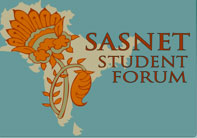 |
• Sheldon Pollock regrets current neglect of Indian classical language study
In an article titled ”The real classical languages debate”. Sheldon Pollock, Professor of Sanskrit and Indian Studies at Columbia University in New York, USA, regrets the current neglect of Indian classical language study and literary scholarship in India. Prof. Pollock reminds that India has shown itself capable of achieving pre-eminence in anything it sets its mind to, and mentions research institutions like IISc, the IITs, and IIMs, and now asks why India should not be able to commit itself to build the same kind of institute to serve the needs of its culture. ”Why should it not build an Indian Institute of the Humanities devoted not just to revivifying the study of the classical languages, but to producing world-class scholarship, as a demonstration of what is possible, a model for universities to follow, and a source of new scholars to staff those universities?”. Read Sheldon Pollock’s article in the Hindu 27 November 2008.
•
Lund University’s advanced International training programme 2009
Lund University Education – the university's company for
commissioned education – offers a number of English-language
educational training programmes funded by the Swedish International
Development Cooperation Agency, Sida, to be held in
the Fall 2009 – Spring 2010.
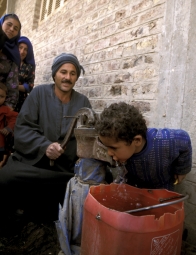 –
The advanced International training programme on ”Sustainable
Urban Water and Sanitation” will run again with a 19 days course in Lund in October 2008, and with a regional seminar in one of the participating countries in April 2009. The overall objective
of the programme is to provide the participants with understanding
and knowledge about the need for integrated approaches and the
organisational and institutional changes that are necessary for
a sustainable provision of water supply and sanitation services
in urban areas. From
South Asia, professionals in the field from Bangladesh, India
and Sri Lanka are welcome to apply for this programme. The programme
is managed by staff from the Dept. of
Water Resources Engineering. Closing date for applications:
9 April 2009. More
information.
–
The advanced International training programme on ”Sustainable
Urban Water and Sanitation” will run again with a 19 days course in Lund in October 2008, and with a regional seminar in one of the participating countries in April 2009. The overall objective
of the programme is to provide the participants with understanding
and knowledge about the need for integrated approaches and the
organisational and institutional changes that are necessary for
a sustainable provision of water supply and sanitation services
in urban areas. From
South Asia, professionals in the field from Bangladesh, India
and Sri Lanka are welcome to apply for this programme. The programme
is managed by staff from the Dept. of
Water Resources Engineering. Closing date for applications:
9 April 2009. More
information.
–
A training programme on ”Urban Transport”
for professionals in the field runs during the Fall 2008 – Spring 2009. From South Asia, persons from Bangladesh,
Bhutan, India, Nepal and Sri Lanka are welcome to apply for this
programme. Closing date for applications was 1 April 2008. More
information.
–
A training programme on ”Road Traffic Safety” runs
during the Fall 2008–Spring 2009. The overall objective of the programme is to provide the participants with understanding and knowl
edge of what organisational and
institutional conditions are necessary
for the management of an efficient
and effective traffic safety work at a
national level.traffic safety problems, carry out
traffic safety investigations, compose
traffic safety schemes and evaluate
their effects. From South Asia, persons from
Bangladesh, Bhutan, Nepal and Sri Lanka have been accepted
for this programme. It
is managed by staff from the Department of Technology and Society, Lund University. More
information.
– A training programme on ”Child
rights, Classroom and School Management” runs during the Spring – Fall 2009. It
consists of two phases: The first phase consists of 3 weeks
in Sweden with
studies in the subject area. This should be combined with a project
work on a part-time basis during 5 months on a relevant task in
the home country. The second phase consists of a follow-up seminar
of the project work during 2 weeks in India, during this phase
the participants will be asked as a part of the course to develop,
discuss and present plans for applying the course content in their
work. Finally, a couple of months after the second phase, a follow-up
visit will be conducted by the mentor to the participants’ home
countries. From South Asia, persons working with pedagogical support
and pedagogical development in Afghanistan, Bangladesh, Bhutan,
India, and Sri Lanka have been accepted
for this programme. Closing
date for applications is 15 December 2008. More
information.
–
A training programme on ”Sexual and
Reproductive Health and Rights – SRHR” runs
during the Spring and Fall 2009. The target group is persons working
with SRHR, in managing position and that have responsibility to
develop capacity and knowledge within SRHR. Participants should
have a background as midwives/teachers in the health care sector
or gynaecologists/obstetricians. From South Asia, persons from
Bangladesh, Bhutan, India, Nepal and Sri Lanka have been accepted
for this programme. The programme
is managed by staff from the Division
of Social Medicine and Global Health, Department of Health
Sciences; Lund University (in Malmö). Deadline for applications: 15 October every year. More
information.
• More information about South Asia related
education at Swedish and Nordic universities
See SASNET’s page, http://www.sasnet.lu.se/education.html
• Roskilde PhD course on Approaching Organizations
A PhD course on ”Approaching Organizations” is organised in Jyllinge, Denmark. 8–10 December 2008. It is jointly organised by the Graduate School in International Development Studies at Roskilde
University, the Danish Institute for International Studies (DIIS), and the Dept. of Political Science, Aarhus University. The course will deal with the analytical and methodological challenges
faced in studying the nature and role of organizations in development. The
course proposes to explore a broad range of organizations from the
international level, such as the World Bank, to the national level, such as
a government ministry or a large NGO, and down to the local levels of small
NGOs, associations and local government departments and agencies. The course
will combine lectures from leading international experts in the field of
organizations in development, and workshops in which Ph.D. students
attending the course present their research projects. Venue: Hotel Søfryd, Jyllinge (15 km north of Roskilde), Denmark. More information.
• INSTEC organises International Workshop in Kochi
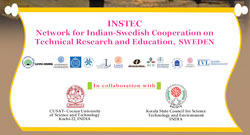 An International Workshop on “The Sustainable City (Sustainable Environmental Technology for
Urban Development)” will be held in Kochi, Kerala, India 10–12 December 2008. The workshop is jointly organised by the Swedish
Network for Indian-Swedish Cooperation on
Technical Research and Education (INSTEC, more information); Kerala State Council for Science, Technology and Environment in Thiruvananthapuram; and Cochin University of Science and Technology (CUSAT) in Kochi. The objective of the workshop is to bring together interested parties from universities, research organizations, industry and governmental organisations, with the purpose of initiating broad and diverse collaboration on development and implementation of environment technology and system solutions for sustainable urban development. The workshop will, apart from knowledge sharing, promote all forms of cooperation, from relatively small and short-term to long-term strategic cooperation and joint-ventures. Full information.
An International Workshop on “The Sustainable City (Sustainable Environmental Technology for
Urban Development)” will be held in Kochi, Kerala, India 10–12 December 2008. The workshop is jointly organised by the Swedish
Network for Indian-Swedish Cooperation on
Technical Research and Education (INSTEC, more information); Kerala State Council for Science, Technology and Environment in Thiruvananthapuram; and Cochin University of Science and Technology (CUSAT) in Kochi. The objective of the workshop is to bring together interested parties from universities, research organizations, industry and governmental organisations, with the purpose of initiating broad and diverse collaboration on development and implementation of environment technology and system solutions for sustainable urban development. The workshop will, apart from knowledge sharing, promote all forms of cooperation, from relatively small and short-term to long-term strategic cooperation and joint-ventures. Full information.
• Lucknow Golden Jubilee Conference of the Indian Society of Labour Economics
The 50th Annual (Golden Jubilee) Conference of the Indian Society of Labour Economics (ISLE) will be organized in Lucknow 13–15 December 2008. It will be organised by the Giri Institute of Development Studies in association with Lucknow University and the Indian Institute of Management (IIM) Lucknow. Professor K.P. Kannan, Member of the National Commission for Enterprises in the Unorganised Sector (NCEUS) is the Conference President. 500 delegates, including a number of distinguished scholars from around the world, are expected to participate in the Conference. The topics selected for the Golden Jubilee Conference are: •
Globalization, Labour Markets and Employment; •
Women Workers in the New Economy; •
Labour Organizations in Independent India; and • Education and Skills in the Emerging Labour Market. Full information.
• SASNET Fermented Foods conference on tropical bio-mass in Kerala
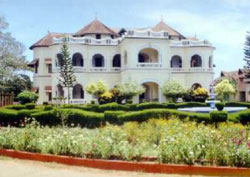 An international seminar and workshop on ”Sustainable Utilization of Tropical Plant Bio-mass” will be held in Thiruvananthapuram, Kerala State, India, 15–16 December 2008. It will be jointly organized by the Centre for Bioinformatics, and the Department of Environmental Sciences of Kerala University; Kerala Agricultural University; Kerala State Council of Science Technology and Environment; the SASNET Fermented Foods (based at Anand Agricultural University, Gujarat); and the Dept. of Applied Nutrition, Lund University. The aim of the conference is to present a platform for discussing sustainable utilization of the tropical plant bio mass addressing not only to the day to day needs of the human beings regarding food, shelter, health and social well-being but also covering aspects of biodiversity, environmental hazards and climatic changes in a long term perspective. Delegates are expected from India, Sri Lanka, Sweden and many other countries. More information.
An international seminar and workshop on ”Sustainable Utilization of Tropical Plant Bio-mass” will be held in Thiruvananthapuram, Kerala State, India, 15–16 December 2008. It will be jointly organized by the Centre for Bioinformatics, and the Department of Environmental Sciences of Kerala University; Kerala Agricultural University; Kerala State Council of Science Technology and Environment; the SASNET Fermented Foods (based at Anand Agricultural University, Gujarat); and the Dept. of Applied Nutrition, Lund University. The aim of the conference is to present a platform for discussing sustainable utilization of the tropical plant bio mass addressing not only to the day to day needs of the human beings regarding food, shelter, health and social well-being but also covering aspects of biodiversity, environmental hazards and climatic changes in a long term perspective. Delegates are expected from India, Sri Lanka, Sweden and many other countries. More information.
• Kathmandu conference on Challenges of Governance in South Asia
An International Conference on ”Challenges of Governance in South Asia” will be held in Kathmandu, Nepal 15–16 December 2008. It focuses on the fact that, in spite of different programs and policies of reforms and reorganizations to streamlining public administration, governance in the South Asian countries has failed to address adequately such issues as reducing poverty, equality of access to public services and fairness, security and safety of citizens, democratic institution building, participation in the decision making, and implementation of policies. The conference is organized under the project “Governance Matters: Assessing, Diagnosing and Addressing Challenges of Governance in Nepal” – a joint research project of the Central Department of Public Administration,Tribhuvan University, Nepal; and the Department of Administration and Organization Theory, University of Bergen, Norway. A number of scholars, experts, and practitioners as well as invited key note speakers will participate in the conference. Full information about the conference.
• Kozhikode conference on WTO, India & Trade Strategy
An International Conference
on ”WTO, India & Trade Strategy” will be held in Kozhikode, Kerala, India, 26–27 December 2008. The conference is organised by the
Centre for Strategic Research & Information Network on India's Global Competitiveness & WTO System at the Indian Institute of Management Kozhikode (IIMK). It focuses on trade policies and trade performance in the pre- and post-WTO era, trying to identify trade performance gaps and future trade potentials. The conference also aims at locating and evaluating future strategies for faster trade growth and greater trade share, and exploring the possibility of outlining a mutually beneficial and harmonious process of global trade negotiations considering the developmental priorities. The WTO Research Centre at IIMK has developed a website for facilitating India's WTO-related information network (go for it). More information.
• Varanasi conference on state of Buddhism, Buddhists and Buddhist Studies
An International Conference on the theme ”The State of Buddhism, Buddhists and Buddhist Studies in India and abroad” will be held in Varanasi, India 2–4 January 2009. It will be organised by the Dept. of Pali and Buddhist Studies, Faculty of Arts at Banaras Hindu University (BHU), and forms part of the commemoration of the 100th birth anniversary of Bhikkhu Jagdish Kashyap, one of the most eminent scholars of Pali and founding figures of specialized centers for studies of Pali and Buddhism in India. His contribution to the research and teaching of Pali as well as the establishment of Buddhist centres is unparalleled. He introduced the teaching of Pali in BHU in 1940-41. He also worked tirelessly to revive the glory of the most ancient and global university town Nalanda by founding the Nava Nalanda Mahavihara. The Mahavihara is now recognized as one of the leading centers of Pali and Buddhism. There are now active efforts are being done to redevelop Nalanda as a global university. Eminent scholars in the field are invited to participate in the conference. For more information, please contact Prof. Lalji Shravak, Head of the Dept. of Pali and Buddhist Studies at BHU.
• BHU symposium on Planet Earth: People, Society And Science
An Interdisciplinary Symposium on ”Planet Earth: People, Society And Science” will be held in Varanasi, India 23–25 January 2009. It will be organised by the Department of Geology at Banaras Hindu University (BHU), to commemorate the Centenary Decade of Earth Science at BHU (2009–2018) and the International Year of the Planet Earth (2008–2009). The focus of the symposium is to make a rational framework for future on the line of sustainable development taking care of interrelationships among various spheres of human activities, including of our modern path breaking scientific pursuits. For details, contact the organisers Prof. Jai Krishna, Head of department, or Prof. Anand Mohan.
• Sixth International Conference by Indian Society of International Law
The Indian Society of International Law (ISIL) holds its Sixth International Conference on ”International Law in The Contemporary World” in New Delhi on 1–4 February 2009. It is also the Golden Jubilee conference for ISIL, since the the Indian Society of International Law (ISIL) was founded in 1959 with the principal objectives to “foster nationwide, the study and development of International Law and to encourage the comparative study of the application of International Law in other States”. All through the past year, ISIL has organised a number of events including special lectures by eminent scholars of international law, seminars, a moot court competition on international law, publication and release of book on history of the ISIL and an edited book on contemporary challenges to international law. The New Delhi conference will form the highlight of these activities since eminent personalities in the field of international law from many countries will participate in discussions on themes which will include • The present state and Public International Law: • Private International Law; • The significance and impact of the World Trade Organisation (WTO); • The expanding regime of Intellectual Property Rights; and • International Arbitration. More information.
• 9th Delhi Sustainable Development Summit at TERI
 The Energy and Resources Institute (TERI) organises its 9th annual DSDS (Delhi Sustainable Development Summit) in New Delhi 5–7 February 2009. The summit will focus on the theme “Towards Copenhagen: an equitable and ethical approach” and explore ways to arrive at a global consensus on climate change beyond 2012. The Delhi Sustainable Development Summits are annual flagship events
of TERI being organized since 2001. They are global fora that seeks to provide
long-term solutions for sustainable development. Every year, DSDS summits witness participation by
global stakeholders including heads of state/government, ministers, and dignitaries
comprising Nobel laureates, development practitioners, scientists, academicians,
and corporate leaders from across the world. As usuak, the DSDS summit will be preceded by a
CEO Forum on Wednesday
4 February 2009. The 2009 CEO Forum will focus on the theme ‘Climate Change: perspective from the change makers in business’. It will review issues and address the challenges businesses are likely to face due to climate change. Focus will be on ‘how’ and ‘why’ green is good. Business opportunities in the emerging scenario will be examined. Venue for TERI’s DSDS summit: Hotel Ashok, New Delhi, India. More information.
The Energy and Resources Institute (TERI) organises its 9th annual DSDS (Delhi Sustainable Development Summit) in New Delhi 5–7 February 2009. The summit will focus on the theme “Towards Copenhagen: an equitable and ethical approach” and explore ways to arrive at a global consensus on climate change beyond 2012. The Delhi Sustainable Development Summits are annual flagship events
of TERI being organized since 2001. They are global fora that seeks to provide
long-term solutions for sustainable development. Every year, DSDS summits witness participation by
global stakeholders including heads of state/government, ministers, and dignitaries
comprising Nobel laureates, development practitioners, scientists, academicians,
and corporate leaders from across the world. As usuak, the DSDS summit will be preceded by a
CEO Forum on Wednesday
4 February 2009. The 2009 CEO Forum will focus on the theme ‘Climate Change: perspective from the change makers in business’. It will review issues and address the challenges businesses are likely to face due to climate change. Focus will be on ‘how’ and ‘why’ green is good. Business opportunities in the emerging scenario will be examined. Venue for TERI’s DSDS summit: Hotel Ashok, New Delhi, India. More information.
• Delhi University seminar on Equity and Education in India
 A National Seminar
on “Equity and Education in India: Policy
Issues and Challenges” will be held in New Delhi 5 –7 March 2009. It is organised by the Central Institute of Education,
University of Delhi. The seminar attempts to address in
comparative terms, the changing circumstances of
Indian economy, policy and society which demand a
time bound effective and participatory strategy
which will be able to empower the formulation
through meaningful interface between the experts
and activist at many levels. It will contribute to
the process in near future.
Venue: Dept. of Education, 33, Chhatra Marg,
Delhi – 110 007. More information.
A National Seminar
on “Equity and Education in India: Policy
Issues and Challenges” will be held in New Delhi 5 –7 March 2009. It is organised by the Central Institute of Education,
University of Delhi. The seminar attempts to address in
comparative terms, the changing circumstances of
Indian economy, policy and society which demand a
time bound effective and participatory strategy
which will be able to empower the formulation
through meaningful interface between the experts
and activist at many levels. It will contribute to
the process in near future.
Venue: Dept. of Education, 33, Chhatra Marg,
Delhi – 110 007. More information.
• Nordic Summer University invites to its first South Asia seminar
![]() The Inaugural Seminar of the Nordic Summer University (NSU) cluster on ”South Asia in the 21st Century” will be held in Tampere, Finland 13–15 March 2009. The NSU cluster ”South Asia in the 21st Century” (more information about the cluster) will hold two seminars a year for the coming three years. The common aim of all the six seminars is ”to achieve a more comprehensive understanding of the subcontinent in the 21st century by exploring multidisciplinary methodologies”. The theme of the March 2009 seminar will be ”Democratic Values and Political Practices in South Asia”. The seminar is organized in collaboration with the International School of Social Sciences (ISSS), University of Tampere. The academic coordinators are Stig Toft Madsen, SASNET; Arild Engelsen Ruud, IKOS, Oslo University; and Kenneth B Nielsen, SUM, Oslo University (with logistical support from NIAS – Nordic Institute of Asian Studies). Abstract with tentative title of presentation should have been submitted by 1 December
2008 to Dr. Stig Toft Madsen. The seminar is open to researchers, postgraduate students (as well as qualified MA students) and professionals. All participants are expected to present a paper and all papers will be given ample time for discussion in the open and engaged forum that is the tradition of the Nordic Summer University. More information about the seminar.
The Inaugural Seminar of the Nordic Summer University (NSU) cluster on ”South Asia in the 21st Century” will be held in Tampere, Finland 13–15 March 2009. The NSU cluster ”South Asia in the 21st Century” (more information about the cluster) will hold two seminars a year for the coming three years. The common aim of all the six seminars is ”to achieve a more comprehensive understanding of the subcontinent in the 21st century by exploring multidisciplinary methodologies”. The theme of the March 2009 seminar will be ”Democratic Values and Political Practices in South Asia”. The seminar is organized in collaboration with the International School of Social Sciences (ISSS), University of Tampere. The academic coordinators are Stig Toft Madsen, SASNET; Arild Engelsen Ruud, IKOS, Oslo University; and Kenneth B Nielsen, SUM, Oslo University (with logistical support from NIAS – Nordic Institute of Asian Studies). Abstract with tentative title of presentation should have been submitted by 1 December
2008 to Dr. Stig Toft Madsen. The seminar is open to researchers, postgraduate students (as well as qualified MA students) and professionals. All participants are expected to present a paper and all papers will be given ample time for discussion in the open and engaged forum that is the tradition of the Nordic Summer University. More information about the seminar.
• 15th Himalayan Languages Symposium to be held in Oregon
 The 15th Himalayan Languages Symposium
will be held at the University of Oregon in
Eugene, USA
31 July – 1 August 2009.
The Himalayan Languages Symposium is an annually convening, open scholarly forum for scholars of Himalayan languages. It serves as a podium for contributions on any language of the greater Himalayan region, whether Burushaski, Kusunda, a Tibeto-Burman language, an Indo-Aryan tongue or other language. Linguists as well as specialists from related disciplines like philology, history, anthropology, archaeology and prehistory are welcome to make their contributions to the study of Himalayan languages and Himalayan language communities.
Deadline for sending abstracts is 1 March 2009. More information.
The 15th Himalayan Languages Symposium
will be held at the University of Oregon in
Eugene, USA
31 July – 1 August 2009.
The Himalayan Languages Symposium is an annually convening, open scholarly forum for scholars of Himalayan languages. It serves as a podium for contributions on any language of the greater Himalayan region, whether Burushaski, Kusunda, a Tibeto-Burman language, an Indo-Aryan tongue or other language. Linguists as well as specialists from related disciplines like philology, history, anthropology, archaeology and prehistory are welcome to make their contributions to the study of Himalayan languages and Himalayan language communities.
Deadline for sending abstracts is 1 March 2009. More information.
• Geoscientists invited to Dhaka conference
Geoscientists from all over the World are cordially invited to attend the International conference on Geoscience for Global Development (GeoDev) to be held in Dhaka, Bangladesh on 26–31 October 2009. The conference will be organized jointly by AGID (Association of Geoscientists for International Development), BGS (Bangladesh Geological Society), GSB (Geological Survey of Bangladesh), and IGEO (International Geoscience Education Organization). This International Conference is intended for exchanging ideas, concepts and activities in geosciences, the science of the Earth. And also for recommending ways and initiatives for sustainable global development, which is also the prime goal of the International Year of Planet Earth (IYPE). More information.
• Other conferences connected to South Asian
studies arranged all over the World
See SASNET’s page, http://www.sasnet.lu.se/conferences.html#conf
Important lectures and seminars in Scandinavia
• Narendra Jadhav keynote speaker at Public Service Summit 2008
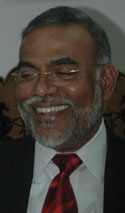 Dr. Narendra Jadhav, Vice Chancellor of Pune University, India will participate as a plenary key speaker at the Public Service Summit 2008, held in Stockholm and Oslo 8–11 December 2008. Dr. Jadhav is a leading educationist, renowned economist and policy-maker, best-selling author, celebrated public speaker and social worker and recipient of numerous prestigious awards. He is also a renowned economist and policy maker. He has served in the Reserve Bank of India for more than 30 years. Dr. Jadhav served for nearly four years (1998-2001) as the Advisor to Executive Director for India at the International Monetary Fund (IMF). Dr. Jadhav has also worked as Senior Economic Advisor to various governments including in Ethiopia and more recently, he was involved in the reconstruction of the Afghanistan economy as the Chief Economic Counsellor. The Public Service Summit is organised by Cisco Systems, one of the leading manufacturers of network equipment, and the global sponsor of the Nobel Peace Prize Concert. The summit is specifically targeted at senior policy advisors and key decision-makers in education, healthcare and government, and focuses on how the internet and networking technologies can change the way to do business. More information.
Dr. Narendra Jadhav, Vice Chancellor of Pune University, India will participate as a plenary key speaker at the Public Service Summit 2008, held in Stockholm and Oslo 8–11 December 2008. Dr. Jadhav is a leading educationist, renowned economist and policy-maker, best-selling author, celebrated public speaker and social worker and recipient of numerous prestigious awards. He is also a renowned economist and policy maker. He has served in the Reserve Bank of India for more than 30 years. Dr. Jadhav served for nearly four years (1998-2001) as the Advisor to Executive Director for India at the International Monetary Fund (IMF). Dr. Jadhav has also worked as Senior Economic Advisor to various governments including in Ethiopia and more recently, he was involved in the reconstruction of the Afghanistan economy as the Chief Economic Counsellor. The Public Service Summit is organised by Cisco Systems, one of the leading manufacturers of network equipment, and the global sponsor of the Nobel Peace Prize Concert. The summit is specifically targeted at senior policy advisors and key decision-makers in education, healthcare and government, and focuses on how the internet and networking technologies can change the way to do business. More information.
•
Stockholm seminar with Krishnammal Jagannathan
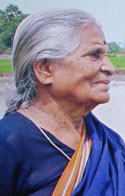 Krishnammal Jagannathan from India, one of the Right Livelihood Award holders 2008, will participate and give a presentation on ”Gandhian vision in practice” as part of a seminar in Stockholm on Tuesday 9 December 2008, 08.30–16.00. The seminar, titled ”Voices for justice – from words to action” will be organised by the Swedish Centre Party International Foundation, in collaboration with the
Right Livelihood Award Foundation, the Women’s International League for Peace and Freedom (IKFF), Dag Hammarskjöld Foundation, and the
Peace Museum. The Right Livelihood Award was established in 1980 to honour and support such people. It has become widely known as the ’Alternative Nobel Prize’ and there are now over 100 laureates from 60 countries. Krishnammal and Sankaralingam Jagannathan, and their organisation LAFTI (Land for the Tillers' Freedom) (India), will receive the award on the same day, for ”two long lifetimes of work dedicated to realising in practice the Gandhian vision of social justice and sustainable human development, for which they have been referred to as 'India's soul'.” Venue for the seminar: Klara Strand Konferens, Lundqvist & Lindqvist, Klarabergsviadukten 90, Stockholm. More information.
Krishnammal Jagannathan from India, one of the Right Livelihood Award holders 2008, will participate and give a presentation on ”Gandhian vision in practice” as part of a seminar in Stockholm on Tuesday 9 December 2008, 08.30–16.00. The seminar, titled ”Voices for justice – from words to action” will be organised by the Swedish Centre Party International Foundation, in collaboration with the
Right Livelihood Award Foundation, the Women’s International League for Peace and Freedom (IKFF), Dag Hammarskjöld Foundation, and the
Peace Museum. The Right Livelihood Award was established in 1980 to honour and support such people. It has become widely known as the ’Alternative Nobel Prize’ and there are now over 100 laureates from 60 countries. Krishnammal and Sankaralingam Jagannathan, and their organisation LAFTI (Land for the Tillers' Freedom) (India), will receive the award on the same day, for ”two long lifetimes of work dedicated to realising in practice the Gandhian vision of social justice and sustainable human development, for which they have been referred to as 'India's soul'.” Venue for the seminar: Klara Strand Konferens, Lundqvist & Lindqvist, Klarabergsviadukten 90, Stockholm. More information.
• Oslo seminar on Nepal’s Constituent Assembly
Dr. Narayan Khadka from Nepal holds an informal public presentation and dialogue at the International Peace Research Institute (PRIO) in Oslo on Monday 15 December 2008, at 12.00. Dr. Khadka, with a PhD in Economics, is currently an elected member of Nepal’s Constituent Assembly (National Parliament), and will be speaking on ”Drafting a New Constitution in Nepal: The Issues”. After a 10-year civil war, Nepal is in the process of drafting a new constitution that will hopefully serve to institutionalize the still fragile peace, but challenges remain. Nepal’s constitution-makers are currently attempting to incorporating the divergent needs of many political parties and civil society groups after a protracted civil conflict, while at the same time attempting to avoid the mistakes of the 1990 Constitution, heralded by many constitutional law experts as once of the best in the world when ratified. Dr. Khadka previously served as Chief Advisor to the Prime Minister of Nepal (1999-2000) and as Vice Chairman, National Planning Commission (2002), and is the author of over two dozen books and academic articles on political economy, international development and foreign policy.
Please RSVP to Jason Miklian if you are interested in attending or have any questions about the event. Venue: PRIO, Philosopher’s Hall, Hausmanns Gate 7,
Oslo. More information.
 • Barnett R. Rubin lectures in Oslo
• Barnett R. Rubin lectures in Oslo
Barnett R. Rubin, Director of Studies and Senior Fellow at the Center on International Cooperation, New York University, USA holds a lecture in Oslo on ”A Regional Approach to Afghanistan?” on Monday 12 January 2008, 14.30–16.00. It is part of an ongoing seminar series organised jointly by Chr. Michelsen Institute (CMI) in Bergen and the International Peace Research Institute (PRIO) in Oslo. In a recent article published in Foreign Affairs – 'From Great Game to Grand Bargain' – Barnett R. Rubin and Ahmed Rashid argued that to reverse the collapse of security in Afghanistan, there was a need for a ”major diplomatic initiative involving all the regional stakeholders in problem-solving talks and setting out road maps for local stabilization efforts”. How can such a new course be set, and what would be its major elements? The Mumbai attack in November last year led to a deterioration of India-Pakistan relations, with potentially severe effects for Afghanistan. The new regime in Washington has signalled a major overhaul of its engagement with Afghanistan and the region. In this seminar, we will take stock of the regional situation, and look critically at possible ways ahead. The seminar will be chaired by Stein Tønnesson, PRIO, and Dr. Kristian Berg Harpviken, PRIO will be the discussant.
Please register your participation by sending an e-mail to: seminar@prio.no. Venue: PRIO, Hausmanns gate 7, Oslo. More information.
Business and Politics
• Sweden increases support to Afghanistan
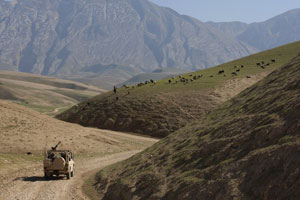 On 13 November 2008, the Swedish Government made important decisions which in various ways will strengthen and improve Sweden's support to Afghanistan. The decisions concern both Sweden’s military contribution to the International Security Assistance Force (ISAF) and the design of a new strategy for our development assistance to Afghanistan. Sweden will strengthen its military presence in Afghanistan through transport aircraft, ambulance helicopters and more training and coordination groups. The Swedish armed force in ISAF is expected to number about 500 people in 2009, compared with the current maximum of 390. The major part of the Swedish contribution will be linked, just as before, to the Provincial Reconstruction Team in Mazar-e-Sharif in northern Afghanistan, which Sweden commands. A particularly important part concerns strengthening Swedish efforts to train and support the Afghan army, so that in the long term it will be able to deal with the threat from groups that are hostile to the government.
On 13 November 2008, the Swedish Government made important decisions which in various ways will strengthen and improve Sweden's support to Afghanistan. The decisions concern both Sweden’s military contribution to the International Security Assistance Force (ISAF) and the design of a new strategy for our development assistance to Afghanistan. Sweden will strengthen its military presence in Afghanistan through transport aircraft, ambulance helicopters and more training and coordination groups. The Swedish armed force in ISAF is expected to number about 500 people in 2009, compared with the current maximum of 390. The major part of the Swedish contribution will be linked, just as before, to the Provincial Reconstruction Team in Mazar-e-Sharif in northern Afghanistan, which Sweden commands. A particularly important part concerns strengthening Swedish efforts to train and support the Afghan army, so that in the long term it will be able to deal with the threat from groups that are hostile to the government.
![]() The Swedish Government also decided to commission the Swedish International Development Cooperation Agency Sida to draw up a strategy proposal for development cooperation with Afghanistan for the period from 1 July 2009 to 31 December 2013. According to the Government's instructions, Sida is to plan for a substantial increase in Swedish development cooperation in Afghanistan from about SEK 300 million at present to about SEK 500 million in two to three years. Swedish initiatives should focus clearly on democracy and state building, human rights and women's rights, not least the right to education.
Moreover, work on the strategy should take as its starting point that about 20-25 per cent of Swedish development cooperation must target the four northern provinces for which Sweden has special responsibility through its leadership of the Provincial Reconstruction Team in Mazar-e Sharif. More information.
The Swedish Government also decided to commission the Swedish International Development Cooperation Agency Sida to draw up a strategy proposal for development cooperation with Afghanistan for the period from 1 July 2009 to 31 December 2013. According to the Government's instructions, Sida is to plan for a substantial increase in Swedish development cooperation in Afghanistan from about SEK 300 million at present to about SEK 500 million in two to three years. Swedish initiatives should focus clearly on democracy and state building, human rights and women's rights, not least the right to education.
Moreover, work on the strategy should take as its starting point that about 20-25 per cent of Swedish development cooperation must target the four northern provinces for which Sweden has special responsibility through its leadership of the Provincial Reconstruction Team in Mazar-e Sharif. More information.
• Information about South Asia related business and politics in Sweden
See SASNET's page, http://www.sasnet.lu.se/polbuss.html
South Asia related culture in Scandinavia
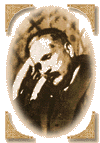 • Report from the Iqbal Day celebrations in Tastrup
• Report from the Iqbal Day celebrations in Tastrup
The Iqbal Academy Scandinavia (IAS) based in Denmark, observed Iqbal Day at Taastrup in Copenhagen, Denmark on Saturday 15 November 2008. It was a peace seminar of which the theme was ”Religion, Peace and Political Violence”. Besides participants from Denmark, delegates from other countries also participated including diplomats and ambassadors from many countries. SASNET was represented by its deputy director Lars Eklund. Read a report from the Iqbal day seminar written by Iram Khawaja, PhD candidate at Roskilde University. More information.
• Annual Ibsen festival initiated in New Delhi
 From December 2008 an annual Ibsen Festival will take place in New Delhi, India. The 2008 Delhi Ibsen Festival will be held 10–20 December. It has been initiated by the Royal Norwegian Embassy in co-operation with Nissar Allana/Dramatic Art & Design Academy (DADA). Allana has a team of Indian Ibsen experts working closely with him. This year the festival will contain three Indian Ibsen productions, two international and a cross-professional seminar. The process that leads up to the events in December, involves Indian experts both within Academia and the theatre and drama world. The first successful meeting between the Indian and the Norwegian professionals was held in September in New Delhi. More information.
From December 2008 an annual Ibsen Festival will take place in New Delhi, India. The 2008 Delhi Ibsen Festival will be held 10–20 December. It has been initiated by the Royal Norwegian Embassy in co-operation with Nissar Allana/Dramatic Art & Design Academy (DADA). Allana has a team of Indian Ibsen experts working closely with him. This year the festival will contain three Indian Ibsen productions, two international and a cross-professional seminar. The process that leads up to the events in December, involves Indian experts both within Academia and the theatre and drama world. The first successful meeting between the Indian and the Norwegian professionals was held in September in New Delhi. More information.
• Mumbai Chamber Music Festival moved to Stockholm
The terror attacks in Mumbai have led to the cancellation of the annual Sangat Chamber Music Festival, but the three concerts will go on, in Sweden. Alan Gilbert, the music director-in-waiting of the New York Philharmonic, arranged to have the festival moved to Stockholm, where he lives because of his stint as music director of the Royal Stockholm Philharmonic Orchestra. Mr. Gilbert had planned to attend the festival this December, because his wife, the cellist Kajsa William-Olsson, is a performer. Sponsors, including the Stockholm Philharmonic’s concert hall, have stepped forward to pay for travel and accommodations for the musicians, who are donating their fees. The festival is run by the Mehli Mehta Foundation, a major promoter of classical music in Mumbai. One of Mehli Mehta’s sons is Zubin Mehta, the conductor, and another is Zarin Mehta, the president of the New York Philharmonic. The concerts take place at Konserthuset in Stockholm on 15, 17 and 18 December 2008. More information.
• More information about South Asia related culture
in Sweden and Scandinavia
See SASNET’s page, http://www.sasnet.lu.se/culture.html
New and updated items on SASNET web site
• Swedish departments where research on
South Asia is going on:
Constantly added to the list of research environments at Swedish
universities, presented by SASNET. The full list now includes 232 departments,
with detailed descriptions of the South Asia related research and education
taking place! Go to http://www.sasnet.lu.se/environment.html
ƒ Dept. of Botany, Stockholm University
ƒ Division of South and Central Asian Studies (incl. Indology and Central Asian Studies), Stockholm University
• Useful travelling information
Look at http://www.sasnet.lu.se/travelling.html.
Updated travel advises from the The British Foreign & Commonwealth
Office about safety aspects on travelling to the countries of
South Asia.
Best regards,
Lars Eklund
deputy director/webmaster
SASNET/Swedish South Asian Studies Network
SASNET is a national network
for research, education, and information about South Asia, based at Lund
University. The aim is to encourage and promote an open and dynamic networking
process, in which Swedish researchers co-operate with researchers in South
Asia and globally.
The network is open to all sciences. Priority is given to co-operation
between disciplines and across faculties, as well as institutions in the
Nordic countries and in South Asia. The basic idea is that South Asian
studies will be most fruitfully pursued in co-operation between researchers,
working in different institutions with a solid base in their mother disciplines.
The network is financed by Sida (Swedish
International Development Cooperation Agency) and by Lund
University.
Postal address: SASNET – Swedish South Asian Studies Network,
Scheelevägen 15 D, SE-223 70 Lund, Sweden
Visiting address: Ideon Research Park, House Alpha 1 (first floor,
room no. 2040), in the premises of the Centre for East and South
East Asian Studies at Lund University (ACE).
Phone: + 46 46 222 73 40
Fax: + 46 46 222 30 41
E-mail: sasnet@sasnet.lu.se
Web site:
http://www.sasnet.lu.se
SASNET - Swedish South Asian Studies Network/Lund
University
Address: Scheelevägen 15 D, SE-223 70 Lund, Sweden
Phone: +46 46 222 73 40
Webmaster: Lars Eklund
Last updated
2010-11-30
